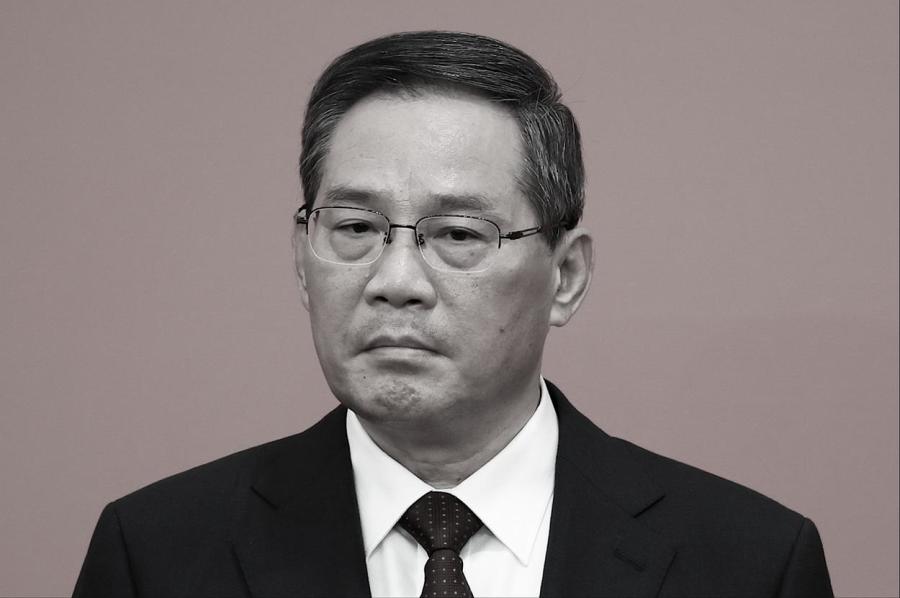Chinese Premier Li Qiang's Profile Photo. (Photo by Lintao Zhang/Getty Images)
[People News] The question of whether Xi Jinping will be re-elected at the 21st National Congress has garnered significant attention both at home and abroad. On August 1, independent overseas media figure Jiang Wangzheng revealed in his program that the current Premier of the State Council, Li Qiang, is increasingly consolidating his power within the Communist Party. Xi Jinping reportedly stated during a Politburo meeting that he will not seek re-election and suggested that there is little difference between Li Qiang stepping in and himself, implying that Li Qiang is poised to take over.
The Politburo meeting held on July 30 announced that the Fourth Plenary Session will convene in October. The agenda for this session will focus on discussing recommendations for the formulation of the 15th Five-Year Plan for national economic and social development.
The so-called '15th Five-Year Plan' refers to the planning period from 2026 to 2030. The Communist Party is set to hold the 21st National Congress in 2027 for a leadership transition. The timeline of the '15th Five-Year Plan' overlaps with the 21st National Congress. This raises the question: is Xi Jinping signaling that he not only will not step down at the Fourth Plenary Session but is also planning to continue his leadership at the 21st National Congress?
Jiang Wangzheng, the independent media figure, stated on August 1 that Xi Jinping's ambition for re-election at the 20th National Congress is not a certainty. He disclosed that Xi Jinping once remarked during a Politburo meeting: 'Many people say I am seeking re-election and taking up others' time. However, I have not taken anyone's time. If I must say I have taken someone else's time, it would be Li Qiang. Li Qiang and I are not much different from each other.'
Jiang Wangzheng remarked that the Chinese Communist Party (CCP) has recently announced numerous personnel appointments across provinces and cities, leading many to believe that Shi Taifeng is quite politically savvy. However, these actions are primarily proposals and initiatives from Li Qiang, which suggest that Shi Taifeng is actively collaborating with Li Qiang.
Jiang Wangzheng further emphasized that as long as Xi Jinping remains the Chairman of the Central Military Commission, he has delegated other responsibilities to Li Qiang, effectively ensuring the continuation of Xi Jinping's power.
In fact, Jiang Wangzheng has been consistently revealing that Li Qiang is Xi Jinping's most trusted ally and is recognized as the successor by the elder faction. This positions Li Qiang as a potential successor acknowledged by various factions within the CCP.
Many analysts have also observed that Li Qiang has been gaining prominence lately, frequently stepping in for Xi Jinping at significant meetings and events.
On July 28, the People's Daily published Xi Jinping's directive titled 'Comprehensively Strengthen Political Responsibility, Implement Detailed Flood Prevention Measures, and Fully Ensure the Safety of People's Lives and Property,' alongside Li Qiang's instructions for disaster relief. This marks a notable departure from previous practices.
Reflecting on the July 26, 2024 article in the People's Daily titled 'The Standing Committee of the Political Bureau of the Central Committee of the Communist Party of China Holds a Meeting to Study and Deploy Flood Prevention and Disaster Relief Work—General Secretary Xi Jinping Presides Over the Meeting,' it is noteworthy that Li Qiang's name was absent.
On July 19, following the halted Xiong'an New Area project, another trillion-yuan infrastructure initiative, the Yarlung Tsangpo River Hydropower Station, was launched. At the groundbreaking ceremony for this monumental project, only Li Qiang among the seven standing committee members was present, suggesting a consolidation of authority.
What has garnered both domestic and international attention is that from July 6 to 7, Li Qiang attended the BRICS summit in Brazil in place of Xi Jinping. This is the first time in 12 years that Xi Jinping has missed this summit.
Additionally, following the discharge of nuclear wastewater from the Fukushima nuclear power plant in Japan into the ocean, China has imposed a complete ban on the import of Japanese seafood products starting in 2023. On June 29, the General Administration of Customs of the Communist Party of China unexpectedly announced a conditional resumption of imports, which is also seen as a strategic move by the State Council under Li Qiang's leadership.
An article published on July 21 revealed that Xi Jinping's three most trusted confidants are Cai Qi, the Secretary of the Central Secretariat, Li Qiang, the Premier, and Ding Xuexiang, the Vice Premier. At present, it seems that Li Qiang is the primary beneficiary of Xi Jinping's gradual delegation of power.
The article indicates that Xi Jinping clearly has a high level of trust in Li Qiang, as Li Qiang has regained some of the powers that were taken from his predecessor, Li Keqiang, including partial decision-making authority over economic policies.
Furthermore, the article notes that Li Qiang wields significant influence within the national bureaucratic system. He is currently the second most powerful figure in the Communist Party, after Xi Jinping, with the authority to convene officials at any time and lead study meetings on topics he designates.
The article also discloses that Shi Taifeng, a former subordinate of Li Qiang, assumed the role of Minister of the Organisation Department in April, gaining substantial control over personnel arrangements within the Party, which will provide significant support to Li Qiang. This power will enable him to influence key personnel decisions for the next government at the 21st National Congress scheduled for 2027.
However, some commentators suggest that Shi Taifeng has a complex background, having been a classmate of faction leaders Li Keqiang and Hu Chunhua at Peking University. His career has intersected with high-ranking officials such as Hu Jintao, Zeng Qinghong, Xi Jinping, and Li Qiang. Observers believe that whether Li Qiang can ultimately become Xi Jinping's successor may still involve unpredictable factors amid the intense internal struggles within the Communist Party of China.
Independent commentator Cai Shenkun has disclosed that Li Qiang has managed to win Xi Jinping's favour because, unlike his predecessor Li Keqiang, he possesses an advantage: he understands politics and is completely loyal to Xi Jinping, which has earned him Xi's trust.
Additionally, some analysts argue that Li Qiang's visibility is even lower than that of Li Keqiang; he is a Prime Minister who appears even weaker than Li Keqiang. In fact, it may be this so-called 'weakness' in 'understanding politics' that has provided reassurance to the strong Xi Jinping regarding Li Qiang.
(People News first published) △







News magazine bootstrap themes!
I like this themes, fast loading and look profesional
Thank you Carlos!
You're welcome!
Please support me with give positive rating!
Yes Sure!